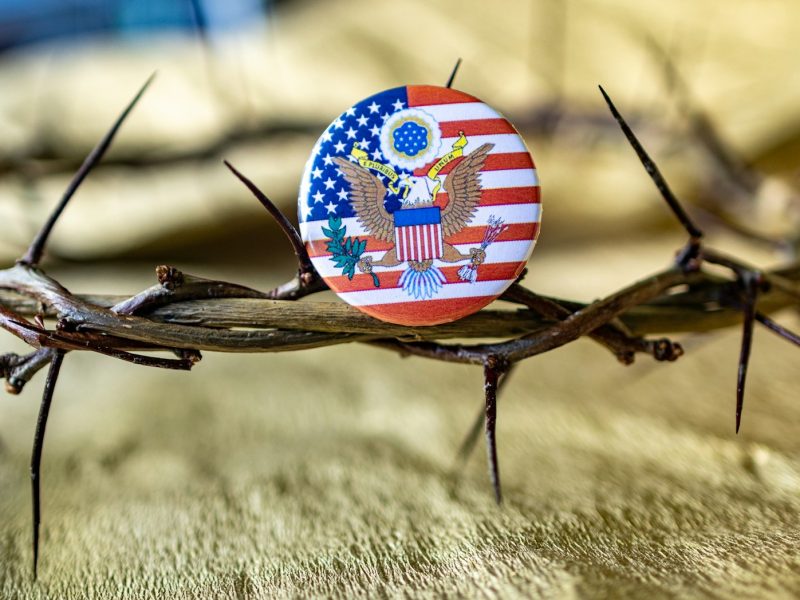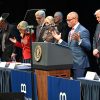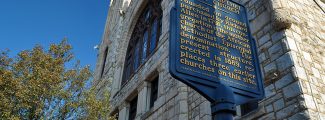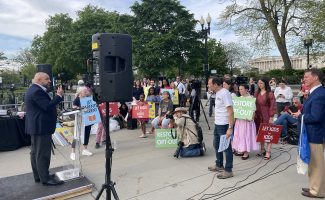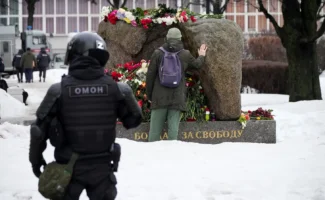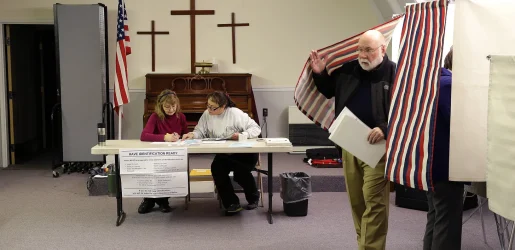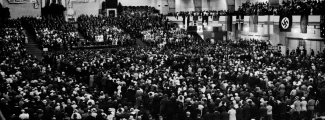Sign up to receive full essays in your inbox!
Featured
Correcting Common Misconceptions About Christian Nationalism
Although researchers have long discussed Christian Nationalism, it’s fairly new to public discourse. Let’s clarify some points that are often misunderstood so we can have an effective, organized response.
One Urban Crossroad, 3 New Districts: Kansas City Braces for Missouri Gerrymander
The Republican plan, urged on by Trump, would crack the city’s urban core into three districts — with all of them converging at Independence Boulevard Christian Church.
Did the SBC Really Endorse the White House’s Prayer Initiative?
A new White House initiative encouraging people to pray for America claims to have the backing of the nation’s largest Protestant denomination. But a spokesperson for the Southern Baptist Convention’s Executive Committee told Word&Way that’s not accurate.
Church
Church Near Pennsylvania Capitol Becomes Peace Hub Hoping To Protect Democracy in Divisive Election
Fear of violence recently prompted Grace United Methodist Church’s pastor to join Choices and Voices for Peace, a coalition of faith leaders from across the state.
Two Historic Philadelphia Churches Offer Lessons for an America Divided Today and in Its Infancy
The site of colonial America's break with the Church of England and the mother church of the nation’s first Black denomination sit less than a mile from each other.
‘Not an Act of God.’ How the Rev. Richard Joyner Became a Farmer, Then a Climate Activist
Richard Joyner has a new rejoinder to his congregants: 'God is not flooding the land. Our behavior is destroying the environment.'
Nation
‘We Were Called Book Burners’: Families React to SCOTUS LGBTQ+ Books Decision
While not definitive, the decision signals the justices’ inclination to see conservative religious parents succeed in their two-year legal challenge to the school policy that has dominated discussions at school boards and divided county residents.
Pastor Films As Masked Federal Agents Arrest Iranian Christian Asylum-Seekers in LA
The arrests sparked angst in the community and have concerned advocates of Iranian Christians who’ve fled persecution from the Islamic regime.
Faith Groups Say House Republicans’ Probe Into Immigration Work Violates Their Religious Freedom
The Homeland Security Committee named the U.S. Conference of Catholic Bishops, Catholic Charities USA, and Lutheran and United Methodist ministries among those under scrutiny.
World
Subversive Are Those Who Mourn
This issue of A Public Witness explores the subversive power of public mourning — like what happened recently after the state murder of Russian political dissident Alexei Navalny — to better understand a Beatitude of Jesus.
For Iranian Converts Claiming Religious Persecution, European Courts Require Proof of Faith
Judges across Europe are having a tough time deciding whether asylum-seekers claiming religious persecution are ‘genuine’ Christians.
Greece Just Legalized Same-Sex Marriage. Will Other Orthodox Countries Join Them Any Time Soon?
Eastern Orthodox leadership, despite lacking a single doctrinal authority like a pope, has been united in opposing recognition of same-sex relationships both within its own rites and in the civil realm.
Editorials
Forgetting Our Past & Our Future
Last week, Alabama Republican Governor Kay Ivey apologized for performing in blackface 52 years ago while a college student at a BSU party, an incident she couldn't recall. If, like Ivey, we can’t remember what our Baptist churches and institutions did in the past, how can we really improve things
Calling a Thing a Thing
As Christians, we are to be people of the Truth. We are to people who speak truthfully, who bear truthful witness about neighbors. And part of that requires us to be willing to call a thing a thing, to call racism racism.
Time to Update Your Church’s History?
Around significant anniversaries, churches will often produce a write-up of their history. But what if we’ve left out some important details? Does your church need to reconsider the ugly parts of our history we may have left out?
Word&Way Voices
The Shock of Israeli Apartheid
Theologian and anti-apartheid activist Allan Boesak reacts to the recent U.S. House of Representatives resolution expressing support for Israel.
The Fragility of Motherhood
Rev. Angela Denker reflects on the unjust and tragic death of sprinter Tori Bowie, one of the fastest women in America.
Writing the Next Chapter in Church History
Contributing writer Sarah Blackwell makes the case that future Christians will point to the names of our colleagues and friends as those who first navigated the waters of leading a church and serving as a wife or mothering a family at the same time.
E-Newsletter
Another Year of Unsettling Advent for Our Unsettling Time
We’re excited to announce that Unsettling Advent is returning with new themes: rulers clinging to power, dangerous pregnancies, and violence in Lebanon.
Christian Nationalism Had a Good Night
While Donald Trump’s win understandingly dominates the headlines, it’s also important to consider the results in the numerous other federal, state, and local races.
Did You Vote in a Church Today?
This Election Day issue of A Public Witness considers the idea that where you vote might influence how you vote.
Books
Review: Becoming Human
Robert D. Cornwall reviews "Becoming Human: The Holy Spirit and the Rhetoric of Race" by Luke A. Powery. This book draws upon theology, especially the theology of the Holy Spirit, to provide a theological foundation for responding to the racialization
Review: Better Religion
Robert D. Cornwall reviews "Better Religion: A Primer for Interreligious Peacebuilding" by John D. Barton. This book provides a set of tools that can help us move toward a greater understanding of one another without jettisoning the distinctiveness of our
Review & Giveaway: Sympathy, Solidarity, & Silence
Historian and former denominational executive Lee Spitzer spent years researching for his new book Sympathy, Solidarity, and Silence: Three European Baptist Responses to the Holocaust. The book tells inspiring and disappointing stories of how Baptists in England, France, and Germany
Review: Father Abraham’s Many Children
Robert D. Cornwall reviews "Father Abraham’s Many Children: The Bible in a World of Religious Difference" by Tyler D. Mayfield with a forward from Eboo Patel. This book invites us to read Genesis from the perspective of religious pluralism as

